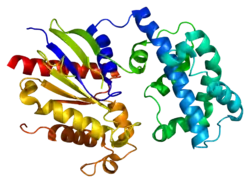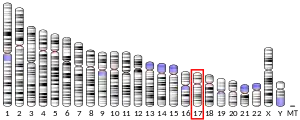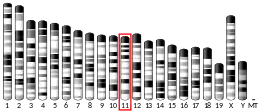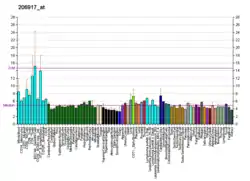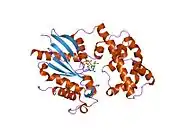GNA13
Guanine nucleotide-binding protein subunit alpha-13 is a protein that in humans is encoded by the GNA13 gene.[5][6]
Interactions and functions
The GNA13 gene encodes the G13 G protein alpha subunit. Together with GNA12, these two proteins comprise one of the four classes of heterotrimeric G protein alpha subunits.[7] Heterotrimeric G proteins function in transducing hormone and neurotransmitter signals detected by cell surface G protein-coupled receptors to intracellular signaling pathways to modulate cell functions. G protein alpha subunits bind to guanine nucleotides and function in a regulatory cycle, and are active when bound to GTP but inactive and associated with the G beta-gamma complex when bound to GDP.[8][9]
Active GTP-bound G12 alpha subunit interacts with and activates ARHGEF1,[10][11][12] ARHGEF11,[13][14] and ARHGEF12.[15][16] These ARHGEF proteins function as guanine nucleotide exchange factors for the Rho small GTPases to regulate the actin cytoskeleton.[17]
GNA13 has been shown to interact with AKAP3,[18] RIC8A,[19][20] and Radixin.[21]
Clinical significance
Recurrent mutations in this gene have been associated to cases of diffuse large B-cell lymphoma.[22][23]
See also
References
- GRCh38: Ensembl release 89: ENSG00000120063 - Ensembl, May 2017
- GRCm38: Ensembl release 89: ENSMUSG00000020611 - Ensembl, May 2017
- "Human PubMed Reference:". National Center for Biotechnology Information, U.S. National Library of Medicine.
- "Mouse PubMed Reference:". National Center for Biotechnology Information, U.S. National Library of Medicine.
- Kabouridis PS, Waters ST, Escobar S, Stanners J, Tsoukas CD (Mar 1995). "Expression of GTP-binding protein alpha subunits in human thymocytes". Molecular and Cellular Biochemistry. 144 (1): 45–51. doi:10.1007/BF00926739. PMID 7791744. S2CID 8911988.
- "Entrez Gene: GNA13 guanine nucleotide binding protein (G protein), alpha 13".
- Strathmann MP, Simon MI (1991). "G alpha 12 and G alpha 13 subunits define a fourth class of G protein alpha subunits". Proc. Natl. Acad. Sci. U.S.A. 88 (13): 5582–6. Bibcode:1991PNAS...88.5582S. doi:10.1073/pnas.88.13.5582. PMC 51921. PMID 1905812.
- Gilman, AG (1987). "G proteins: transducers of receptor-generated signals". Annual Review of Biochemistry. 56: 615–649. doi:10.1146/annurev.bi.56.070187.003151. PMID 3113327.
- Rodbell, M (1995). "Nobel Lecture: Signal transduction: Evolution of an idea". Bioscience Reports. 15 (3): 117–133. doi:10.1007/bf01207453. PMC 1519115. PMID 7579038. S2CID 11025853.
- Johnson EN, Seasholtz TM, Waheed AA, Kreutz B, Suzuki N, Kozasa T, Jones TL, Brown JH, Druey KM (Dec 2003). "RGS16 inhibits signalling through the G alpha 13-Rho axis". Nature Cell Biology. 5 (12): 1095–103. doi:10.1038/ncb1065. PMID 14634662. S2CID 6798899.
- Bhattacharyya R, Wedegaertner PB (Apr 2003). "Mutation of an N-terminal acidic-rich region of p115-RhoGEF dissociates alpha13 binding and alpha13-promoted plasma membrane recruitment". FEBS Letters. 540 (1–3): 211–6. doi:10.1016/s0014-5793(03)00267-9. PMID 12681510. S2CID 84132104.
- Hart MJ, Jiang X, Kozasa T, Roscoe W, Singer WD, Gilman AG, Sternweis PC, Bollag G (Jun 1998). "Direct stimulation of the guanine nucleotide exchange activity of p115 RhoGEF by Galpha13". Science. 280 (5372): 2112–4. doi:10.1126/science.280.5372.2112. PMID 9641916.
- Fukuhara, S; Murga, C; Zohar, M; Igishi, T; Gutkind, JS (1999-02-26). "A novel PDZ domain containing guanine nucleotide exchange factor links heterotrimeric G proteins to Rho". Journal of Biological Chemistry. 274 (9): 5868–5879. doi:10.1074/jbc.274.9.5868. PMID 10026210.
- Rümenapp, U; Blomquist, A; Schwörer, G; Schablowski, H; Psoma, A; Jakobs, KH (1999-10-15). "Rho-specific binding and guanine nucleotide exchange catalysis by KIAA0380, a dbl family member". FEBS Letters. 459 (3): 313–318. doi:10.1016/s0014-5793(99)01270-3. PMID 10526156. S2CID 8529412.
- Fukuhara S, Chikumi H, Gutkind JS (November 2000). "Leukemia-associated Rho guanine nucleotide exchange factor (LARG) links heterotrimeric G proteins of the G(12) family to Rho". FEBS Letters. 485 (2–3): 183–8. doi:10.1016/S0014-5793(00)02224-9. PMID 11094164. S2CID 7300556.
- Suzuki N, Nakamura S, Mano H, Kozasa T (January 2003). "Galpha 12 activates Rho GTPase through tyrosine-phosphorylated leukemia-associated RhoGEF". Proceedings of the National Academy of Sciences of the United States of America. 100 (2): 733–8. Bibcode:2003PNAS..100..733S. doi:10.1073/pnas.0234057100. PMC 141065. PMID 12515866.
- Dhanasekaran N, Dermott JM (1996). "Signaling by the G12 class of G proteins". Cell. Signal. 8 (4): 235–45. doi:10.1016/0898-6568(96)00048-4. PMID 8842523.
- Niu J, Vaiskunaite R, Suzuki N, Kozasa T, Carr DW, Dulin N, Voyno-Yasenetskaya TA (Oct 2001). "Interaction of heterotrimeric G13 protein with an A-kinase-anchoring protein 110 (AKAP110) mediates cAMP-independent PKA activation". Current Biology. 11 (21): 1686–90. doi:10.1016/s0960-9822(01)00530-9. PMID 11696326. S2CID 19027128.
- Tall GG, Krumins AM, Gilman AG (Mar 2003). "Mammalian Ric-8A (synembryn) is a heterotrimeric Galpha protein guanine nucleotide exchange factor". The Journal of Biological Chemistry. 278 (10): 8356–62. doi:10.1074/jbc.M211862200. PMID 12509430.
- Wang L, Guo D, Xing B, Zhang JJ, Shu HB, Guo L, Huang XY (September 2011). "Resistance to inhibitors of cholinesterase-8A (Ric-8A) is critical for growth factor receptor-induced actin cytoskeletal reorganization". The Journal of Biological Chemistry. 286 (35): 31055–61. doi:10.1074/jbc.M111.253427. PMC 3162464. PMID 21771786.
- Vaiskunaite R, Adarichev V, Furthmayr H, Kozasa T, Gudkov A, Voyno-Yasenetskaya TA (Aug 2000). "Conformational activation of radixin by G13 protein alpha subunit". The Journal of Biological Chemistry. 275 (34): 26206–12. doi:10.1074/jbc.M001863200. PMID 10816569.
- Morin RD, Mendez-Lago M, Mungall AJ, Goya R, Mungall KL, Corbett RD, Johnson NA, Severson TM, Chiu R, Field M, Jackman S, Krzywinski M, Scott DW, Trinh DL, Tamura-Wells J, Li S, Firme MR, Rogic S, Griffith M, Chan S, Yakovenko O, Meyer IM, Zhao EY, Smailus D, Moksa M, Chittaranjan S, Rimsza L, Brooks-Wilson A, Spinelli JJ, Ben-Neriah S, Meissner B, Woolcock B, Boyle M, McDonald H, Tam A, Zhao Y, Delaney A, Zeng T, Tse K, Butterfield Y, Birol I, Holt R, Schein J, Horsman DE, Moore R, Jones SJ, Connors JM, Hirst M, Gascoyne RD, Marra MA (Aug 2011). "Frequent mutation of histone-modifying genes in non-Hodgkin lymphoma". Nature. 476 (7360): 298–303. Bibcode:2011Natur.476..298M. doi:10.1038/nature10351. PMC 3210554. PMID 21796119.
- Lohr JG, Stojanov P, Lawrence MS, Auclair D, Chapuy B, Sougnez C, Cruz-Gordillo P, Knoechel B, Asmann YW, Slager SL, Novak AJ, Dogan A, Ansell SM, Link BK, Zou L, Gould J, Saksena G, Stransky N, Rangel-Escareño C, Fernandez-Lopez JC, Hidalgo-Miranda A, Melendez-Zajgla J, Hernández-Lemus E, Schwarz-Cruz y Celis A, Imaz-Rosshandler I, Ojesina AI, Jung J, Pedamallu CS, Lander ES, Habermann TM, Cerhan JR, Shipp MA, Getz G, Golub TR (Mar 2012). "Discovery and prioritization of somatic mutations in diffuse large B-cell lymphoma (DLBCL) by whole-exome sequencing". Proceedings of the National Academy of Sciences of the United States of America. 109 (10): 3879–84. Bibcode:2012PNAS..109.3879L. doi:10.1073/pnas.1121343109. PMC 3309757. PMID 22343534.
Further reading
- Ruppel KM, Willison D, Kataoka H, Wang A, Zheng YW, Cornelissen I, Yin L, Xu SM, Coughlin SR (Jun 2005). "Essential role for Galpha13 in endothelial cells during embryonic development". Proceedings of the National Academy of Sciences of the United States of America. 102 (23): 8281–8286. Bibcode:2005PNAS..102.8281R. doi:10.1073/pnas.0503326102. PMC 1149452. PMID 15919816.
- Downes GB, Gautam N (Dec 1999). "The G protein subunit gene families". Genomics. 62 (3): 544–52. doi:10.1006/geno.1999.5992. PMID 10644457.
- Offermanns S, Laugwitz KL, Spicher K, Schultz G (Jan 1994). "G proteins of the G12 family are activated via thromboxane A2 and thrombin receptors in human platelets". Proceedings of the National Academy of Sciences of the United States of America. 91 (2): 504–8. Bibcode:1994PNAS...91..504O. doi:10.1073/pnas.91.2.504. PMC 42977. PMID 8290554.
- Laugwitz KL, Allgeier A, Offermanns S, Spicher K, Van Sande J, Dumont JE, Schultz G (Jan 1996). "The human thyrotropin receptor: a heptahelical receptor capable of stimulating members of all four G protein families". Proceedings of the National Academy of Sciences of the United States of America. 93 (1): 116–20. Bibcode:1996PNAS...93..116L. doi:10.1073/pnas.93.1.116. PMC 40189. PMID 8552586.
- Offermanns S, Hu YH, Simon MI (Oct 1996). "Galpha12 and galpha13 are phosphorylated during platelet activation". The Journal of Biological Chemistry. 271 (42): 26044–8. doi:10.1074/jbc.271.42.26044. PMID 8824244.
- Offermanns S, Mancino V, Revel JP, Simon MI (Jan 1997). "Vascular system defects and impaired cell chemokinesis as a result of Galpha13 deficiency". Science. 275 (5299): 533–6. doi:10.1126/science.275.5299.533. PMID 8999798. S2CID 32210248.
- Macrez-Leprêtre N, Kalkbrenner F, Morel JL, Schultz G, Mironneau J (Apr 1997). "G protein heterotrimer Galpha13beta1gamma3 couples the angiotensin AT1A receptor to increases in cytoplasmic Ca2+ in rat portal vein myocytes". The Journal of Biological Chemistry. 272 (15): 10095–102. doi:10.1074/jbc.272.15.10095. PMID 9092554.
- Hart MJ, Jiang X, Kozasa T, Roscoe W, Singer WD, Gilman AG, Sternweis PC, Bollag G (Jun 1998). "Direct stimulation of the guanine nucleotide exchange activity of p115 RhoGEF by Galpha13". Science. 280 (5372): 2112–4. doi:10.1126/science.280.5372.2112. PMID 9641916.
- Becker KP, Garnovskaya M, Gettys T, Halushka PV (Jul 1999). "Coupling of thromboxane A2 receptor isoforms to Galpha13: effects on ligand binding and signalling". Biochimica et Biophysica Acta (BBA) - Molecular Cell Research. 1450 (3): 288–96. doi:10.1016/S0167-4889(99)00068-3. PMID 10395940.
- Windh RT, Lee MJ, Hla T, An S, Barr AJ, Manning DR (Sep 1999). "Differential coupling of the sphingosine 1-phosphate receptors Edg-1, Edg-3, and H218/Edg-5 to the G(i), G(q), and G(12) families of heterotrimeric G proteins". The Journal of Biological Chemistry. 274 (39): 27351–8. doi:10.1074/jbc.274.39.27351. PMID 10488065.
- Brydon L, Roka F, Petit L, de Coppet P, Tissot M, Barrett P, Morgan PJ, Nanoff C, Strosberg AD, Jockers R (Dec 1999). "Dual signaling of human Mel1a melatonin receptors via G(i2), G(i3), and G(q/11) proteins". Molecular Endocrinology. 13 (12): 2025–38. doi:10.1210/me.13.12.2025. PMID 10598579.
- Bhattacharyya R, Wedegaertner PB (May 2000). "Galpha 13 requires palmitoylation for plasma membrane localization, Rho-dependent signaling, and promotion of p115-RhoGEF membrane binding". The Journal of Biological Chemistry. 275 (20): 14992–9. doi:10.1074/jbc.M000415200. PMID 10747909.
- Vaiskunaite R, Adarichev V, Furthmayr H, Kozasa T, Gudkov A, Voyno-Yasenetskaya TA (Aug 2000). "Conformational activation of radixin by G13 protein alpha subunit". The Journal of Biological Chemistry. 275 (34): 26206–12. doi:10.1074/jbc.M001863200. PMID 10816569.
- Shi CS, Sinnarajah S, Cho H, Kozasa T, Kehrl JH (Aug 2000). "G13alpha-mediated PYK2 activation. PYK2 is a mediator of G13alpha -induced serum response element-dependent transcription". The Journal of Biological Chemistry. 275 (32): 24470–6. doi:10.1074/jbc.M908449199. PMID 10821841.
- Ponimaskin E, Behn H, Adarichev V, Voyno-Yasenetskaya TA, Offermanns S, Schmidt MF (Jul 2000). "Acylation of Galpha(13) is important for its interaction with thrombin receptor, transforming activity and actin stress fiber formation". FEBS Letters. 478 (1–2): 173–7. doi:10.1016/S0014-5793(00)01845-7. PMID 10922491. S2CID 31417083.
- Jin S, Exton JH (Nov 2000). "Activation of RhoA by association of Galpha(13) with Dbl". Biochemical and Biophysical Research Communications. 277 (3): 718–21. doi:10.1006/bbrc.2000.3744. PMID 11062019.
- Fukuhara S, Chikumi H, Gutkind JS (Nov 2000). "Leukemia-associated Rho guanine nucleotide exchange factor (LARG) links heterotrimeric G proteins of the G(12) family to Rho". FEBS Letters. 485 (2–3): 183–8. doi:10.1016/S0014-5793(00)02224-9. PMID 11094164. S2CID 7300556.
- Meigs TE, Fields TA, McKee DD, Casey PJ (Jan 2001). "Interaction of Galpha 12 and Galpha 13 with the cytoplasmic domain of cadherin provides a mechanism for beta -catenin release". Proceedings of the National Academy of Sciences of the United States of America. 98 (2): 519–24. doi:10.1073/pnas.021350998. PMC 14619. PMID 11136230.
External links
- Overview of all the structural information available in the PDB for UniProt: P27601 (Mouse Guanine nucleotide-binding protein subunit alpha-13) at the PDBe-KB.
This article incorporates text from the United States National Library of Medicine, which is in the public domain.
